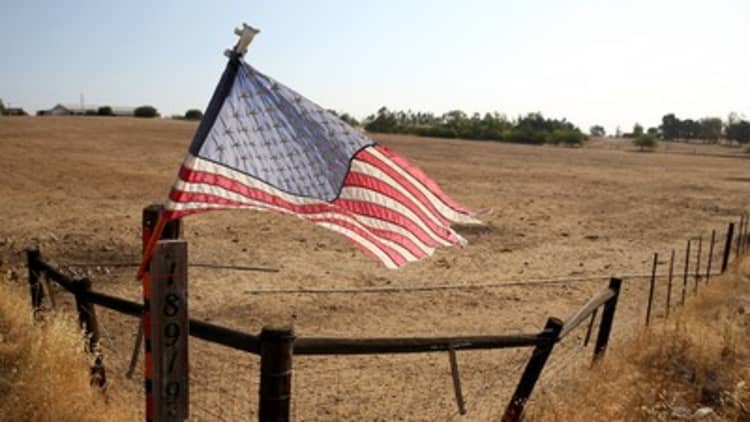
In California, water may be increasingly difficult to come by, but it hasn't gotten harder to pay for.
Californians are being forced to slash their water use as some predict that yet another year of drought could empty the state's reservoirs. The massive Metropolitan Water District of Southern California (MWD), serving nearly 19 million customers, has decided to spend $350 million in reserve funds to reimburse people who tear out their lawns. In essence, that's $350 million already paid by customers now going to reimburse some of those same customers for using less water.
So much money, so little water. One might assume monthly water bills are costing Californians a fortune. Not quite.
Read MoreDrought to deluge? El Nino's impact on California
This reporter's water bill, for example, was $66 in March and $80 in April—and that's for a house with a pool. That averages out to about $2.50 a day, less than the price of a latte.
Gary Breaux, chief financial officer of MWD, estimates the average Californian pays "anywhere from $40 to $60, $70 a month depending on the region."
That $40-$70 is less than most Californians pay in a week for gasoline or groceries, and it's often lower than most monthly bills for cable, cellphones, broadband or electricity.
Cheap water, explained
Water is relatively cheap in most of California because the water itself is basically free. Customers are really paying only for the cost of pumping and transporting the water, and the administration costs of water agencies.
"We're bringing water from Northern California to 400 miles of canals," said Breaux. "For the Colorado River, it's coming (from) over 200 miles away from the Arizona-California border."
Read MoreCalifornia's drought no match for its tourism industry
It takes a lot of power to move that water. But what is being moved—the water itself—has no price. Breaux said the only time water carries a premium is when one agency sells excess water to another.
Another reason water remains cheap is that it's been years since California made large investments in new reservoirs or infrastructure, which would naturally create costs that are passed along. Instead, the state has mostly managed to "conserve itself" out of droughts. For example, the MWD has 5 million more customers than it did 25 years ago, yet less water is being used. Per capita usage has dropped from 200 gallons per day to 150.
Despite Californians using less water, the MWD's revenue is up this year. Breaux said the agency is selling more water to other agencies that don't have enough.
"Likewise, our expenses have been lowered because there's been very little water from the State Water Project"—a state-run system for storing and distributing water that serves two-thirds of California's population—"so our pumping costs are lower," he said.
Rates seen rising ... eventually
Ironically, the more people conserve, the lower the water agency revenue, which means eventually rates will have to go up.
"I think most customers think, 'If I'm using less, my rates shouldn't go up,'" said Breaux. "But most of the cost—80 percent of the costs—are fixed, so whenever you need to turn on the tap, the water is there."
In addition, Breaux said he believes investments will be needed at some point in building more water storage and better methods of recycling water. That will cost a lot of money—more than cash-for-lawn rebates cost.
"The cost of water is going to rise, probably faster than a lot of other things," he said. Breaux pointed to Australia, which invested in desalination plants after 12 years of drought, "and the average bill went up (by) $40 a month."
No one is going to like that, the MWD's chief money manager predicted. When it comes to water, Breaux said customers think, "It's almost like air. They think everyone should have it, and everyone does need it. It's essential."


